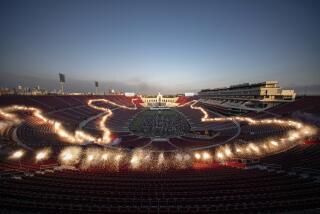California Theatre Bans Rap Events
- Share via
In response to the increasingly volatile nature of some rap concerts, the California Theatre has added its name to the list of concert halls banning the events.
In the wake of a Dec. 17 melee--allegedly started by gang members--in which one man was arrested and another suffered a broken leg, the theater’s management has announced that it will no longer hold rap concerts, because of the violence they seem to provoke.
Cheryl Steele, the new executive director of the theater, felt the only solution was an outright ban.
“I’m sorry we had to be the first concert (in San Diego) that ran into trouble,” Steele said. “It was the first rap concert, and I don’t intend to do any more.”
Rap Has Roots in Inner Cities
Rap, a form of music in which a performer recites rhyming verses rather than sings lyrics, has its roots in the nation’s inner cities and has been popularized by black performers. In just a few years, it has spread from its on-the-streets origins and is now played on radio and performed in nightclubs and auditoriums.
But violence has accompanied rap’s rise in popularity throughout the country, and San Diego is merely the most recent example.
In 1986, a man was killed during a rap concert at Selland Arena in Fresno. At the Long Beach Arena, a melee led to 40 people being injured.
Disturbances have also occurred at the Hollywood Palladium, in November, 1987; at the Nassau Coliseum and Madison Square Garden in New York; and at concerts in Pittsburgh, St. Louis, Cincinnati and Detroit. The Nassau Coliseum has stopped scheduling rap concerts indefinitely.
But rap’s defenders say these occurrences are isolated episodes and that much in rap music provides today’s teen-agers with positive messages. The problem, they say, is that the music is often misunderstood and unfairly judged.
“All rap is not bad,” said Darryl Cox, station manager of black radio station XHRM in San Diego, “and not all rap concerts are of a violent nature. There are all kinds of rap groups. Underground rap groups are, for the most part, gang members. The rap you hear on the radio is pretty much ‘clean’ rap. (Rap is) like comedy; there’s the clean stuff and there’s the stuff in the plain brown wrapper.”
Cox said it is the little-known, obscure rap artists who perpetuate violence and, consequently, stigmatize the entire culture. Well-known artists confront demoralizing inner-city conditions, gangs and drugs, he said.
According to Steele, the theater’s executive director, with rap concerts “you’re running a risk. I don’t feel people want to be body-searched when they come into a theater. He said he banned rap concerts “to ensure the safety of other patrons who are coming here to have a good time.”
Steele said the theater was leased the night of the rap concert to San Diego music promoter Charles Moore, who organized the performance. She said it was done before her arrival to the theater a week ago.
Steele, a former reporter for USA Today, said she had covered gangs and feared that two performers--N.W.A. and Eazy E.--were affiliated with gangs and had taken precautions to make sure the Police Department was on hand.
The two other rap groups that performed last Saturday were King T. and E.P.M.D. None of the performers except E.P.M.D. was considered mainstream rap, Cox said. In fact, both Eazy E. and N.W.A. performed at the November, 1987, rap concert at the Hollywood Palladium in which gang members began rioting.
But promoter Moore vigorously denied that any of the performers is associated with gangs.
“Why would they be? I hire entertainment,” Moore said. “They were businessmen. People say rap concerts generate disturbances. Well, you have disturbances at football games.”
Moore said he believes the audience itself was the source of the gang rivalry. “As far as the audience is concerned, you cannot control who buys those tickets.”
Heavy Metal, Punk Have Similar Reputations
Bill Silva, another promoter in San Diego, said the California Theatre “had groups that had a propensity for violence,” and are of the type that “you have to take real strong measures for.”
But he emphasized that violence is not limited to rap concerts. Heavy metal and punk rock concerts have similar reputations, Silva said.
“Adding the gang element certainly increases the chance that something’s going to happen, but for heavy metal and punk, we expect there to be violence, too,” he said. “We just need to educate our audiences that, if they continue to be destructive, they won’t see the shows.”
But Gus Kontopulus of Staffpro, the company that provided security for the concert at the California, said the firm doesn’t usually have problems at rap concerts, although they take extra precautions, such as using a metal detector and adding staff.
Phil Quinn, general manager of the San Diego Sports Arena, said that facility has presented famous rap groups with few or no problems. “We had major rap groups, and we haven’t experienced the problems they experienced downtown. We’ve had rap shows (with audiences) of up to 11,000 and 12,000 people and had a very small number of problems.”
More to Read
The biggest entertainment stories
Get our big stories about Hollywood, film, television, music, arts, culture and more right in your inbox as soon as they publish.
You may occasionally receive promotional content from the Los Angeles Times.










